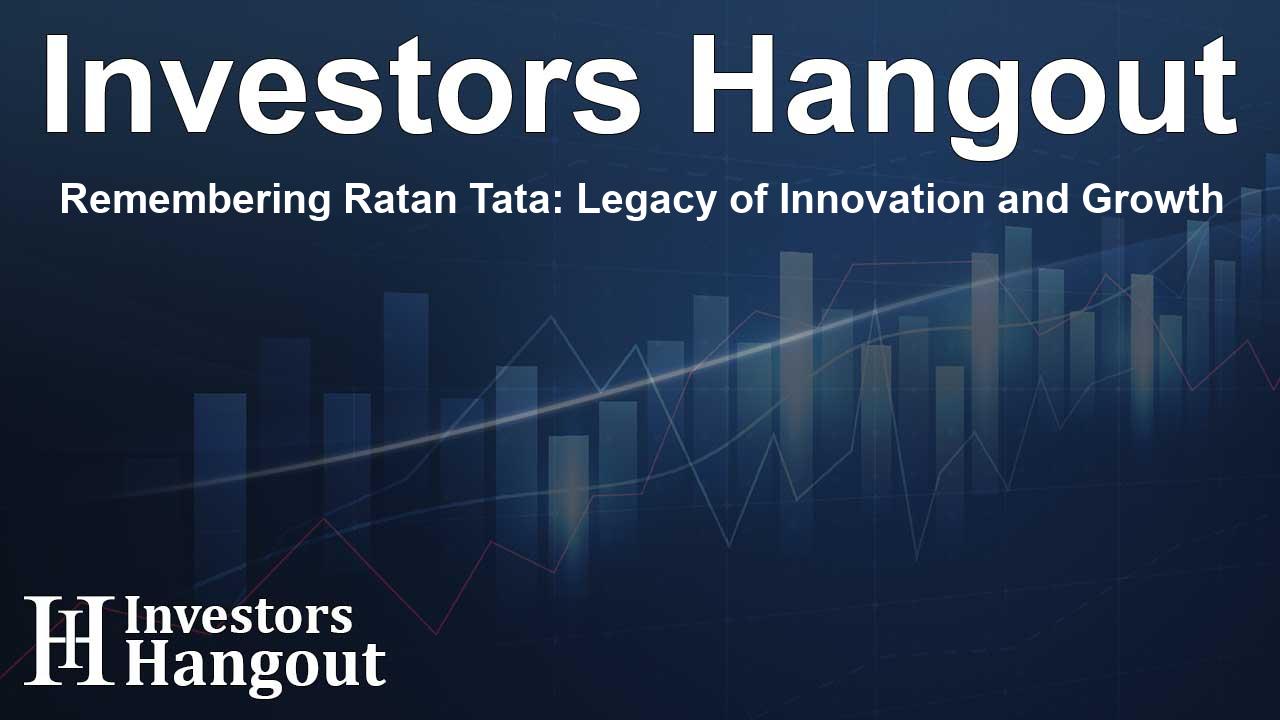Remembering Ratan Tata: Legacy of Innovation and Growth

Transforming Tata Group into a Global Leader
Ratan Tata, the esteemed former chairman of Tata Group, has passed away at the age of 86. His remarkable leadership and vision propelled the Indian conglomerate into the global arena, marking an era of unprecedented growth and innovation.
Tata’s journey began at Cornell University, where he earned a degree in architecture before returning to India to join the family legacy in 1962. He embraced the complexities of the Tata Group with fervor, leaving an indelible mark across its various enterprises, including Tata Motors and Tata Steel.
Key Contributions to Tata Group
Stepping into the chairman position in 1991, Ratan Tata was at the helm during a time of major economic reforms in India. His strategic initiatives included the reinforcement of leadership structures by enforcing retirement ages and promoting capable youth to positions of influence. This marked a significant cultural shift within the organization, setting the stage for future endeavors.
Under his guidance, the Tata Group ventured into telecommunications with the establishment of Tata Teleservices in 1996 and the public listing of Tata Consultancy Services (TCS) in 2004, which became a cornerstone of the group’s success.
Global Acquisitions and Innovations
Ratan Tata viewed acquisitions as vital to the expansion of Tata Group. His perspective led to landmark purchases, such as the British tea firm Tetley in 2000 and the steelmaker Corus in 2007, which was notably one of the largest foreign acquisitions by an Indian firm at that time. His passion for automobiles also steered Tata Motors towards the acquisition of luxury brands Jaguar and Land Rover from Ford in 2008, reinforcing Tata's presence in the global market.
Pioneering Affordable Automobiles
A true innovator, Ratan Tata was pivotal in the creation of the Indica, India’s first indigenously designed passenger car. His dream of producing an affordable car also culminated in the launch of the Nano, aimed at bolstering mobility for a broader segment of the Indian populace. Despite initial setbacks with the Nano, Tata remained a staunch advocate for accessible transportation.
A Leader Beyond Business
Ratan Tata was not just a business magnate; he was a compassionate philanthropist known for his modest lifestyle. His significant contributions to society were reflected in the fact that two-thirds of Tata Sons' share capital is held by philanthropic trusts, emphasizing his commitment to social causes.
Despite controversies, including a very public fallout with Cyrus Mistry, Tata’s legacy as a leader of integrity and innovation remains untarnished. After distancing himself from day-to-day operations at Tata Group, Tata became a prominent investor, nurturing numerous start-ups across India and supporting emerging technologies.
Among his numerous accolades, Ratan Tata received the Padma Vibhushan in 2008, recognized for his exceptional service in trade and industry, underscoring his impactful journey within the business world and beyond.
Frequently Asked Questions
What were Ratan Tata's major contributions to the Tata Group?
Ratan Tata transformed the Tata Group through acquisitions of international firms, the establishment of new companies like Tata Teleservices, and innovation in the automobile sector, particularly with the Indica and Nano.
How did Ratan Tata change the Tata Group's management structure?
He enforced retirement ages and promoted younger leaders to senior positions, creating a more dynamic and controlled management structure within the group.
What was Ratan Tata's vision for the Nano car?
Tata aimed to make a car that was affordable for the masses, promoting mobility for a wider segment of society, although the model faced challenges after launch.
What philanthropic efforts is Ratan Tata known for?
Ratan Tata's philanthropic efforts include holding substantial shares in Tata Sons through trusts dedicated to social welfare and development, reflecting his commitment to giving back to society.
What legacy did Ratan Tata leave behind?
Ratan Tata's legacy includes his transformative vision for the Tata Group, fostering growth through innovation, acquisitions, and a commitment to social responsibility, making him a respected figure in business and philanthropy.
About Investors Hangout
Investors Hangout is a leading online stock forum for financial discussion and learning, offering a wide range of free tools and resources. It draws in traders of all levels, who exchange market knowledge, investigate trading tactics, and keep an eye on industry developments in real time. Featuring financial articles, stock message boards, quotes, charts, company profiles, and live news updates. Through cooperative learning and a wealth of informational resources, it helps users from novices creating their first portfolios to experts honing their techniques. Join Investors Hangout today: https://investorshangout.com/
Disclaimer: The content of this article is solely for general informational purposes only; it does not represent legal, financial, or investment advice. Investors Hangout does not offer financial advice; the author is not a licensed financial advisor. Consult a qualified advisor before making any financial or investment decisions based on this article. The author's interpretation of publicly available data shapes the opinions presented here; as a result, they should not be taken as advice to purchase, sell, or hold any securities mentioned or any other investments. The author does not guarantee the accuracy, completeness, or timeliness of any material, providing it "as is." Information and market conditions may change; past performance is not indicative of future outcomes. If any of the material offered here is inaccurate, please contact us for corrections.